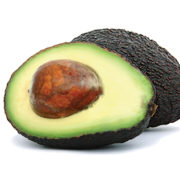Why You Shouldn’t Eat Avocado Seeds
After most people indulge in a luscious avocado, they discard the seed. However, a recent internet piece advises that people eat the seeds because they are so full of nutritious and health-promoting compounds. And they are! The article is wildly popular and had been shared 17,400 times on Facebook as of February 28, 2018.
Who can argue with this premise? Certainly not all the people who shared the article. However, like many things on the web, this is only half the story. What the article fails to mention is that avocado seeds also contain a number of toxins. The California Avocado Society recommends against eating the seeds—although they do encourage you to eat the fruit.
Are Avocado Seeds Toxic?
Eating an avocado seed will not kill you, but you should think twice considering the number of toxins in it. Like many seeds, avocado pits contain a small amount of cyanide complexed to larger molecules. When eaten, our bodies convert these compounds to hydrogen cyanide – the active form of the molecule. However, the amount of cyanide in an avocado seed is too small to hurt you.
Among its many bioactive compounds, avocado seeds contain a compound called persin. This chemical has a number of properties that benefit the fruit. It helps protect against decay by fungi, and it inhibits the growth of insects that feed on the seed.
While persin is not directly toxic to humans, its presence in the seeds and fruit of avocado can cause problems under some conditions. One is if you take the anti-cancer drug tamoxifen. Persin causes this drug to become more toxic to cells. Therefore, it is best to avoid eating avocado fruit or seeds if you take tamoxifen.
If you are allergic to latex, you should also avoid avocado fruit. Eating them can trigger the same type of allergic response as latex.
Why do Fruit Contain Seeds?
You have probably never thought about the purpose of fruit in nature. Tasty fruit entice animals to eat them. The animals then travel away from the original plant and deposit the seeds on the ground where ideally they grow into new plants. While many animals love avocado fruit, scientists think that the organisms that originally dispersed these seeds over large distances were giant sloths that have since gone extinct.
For this strategy to work, animals should eat the ripe fruit and not the unripe ones. The flesh of unripe avocado fruit is full of foul-tasting compounds that both keep animals from eating them and protect from that orange fungus that grows on the ripe fruit. To become edible, the fruit detoxify themselves to get rid of the foul-tasting compounds, so that animals will now eat them.
These complex fruits are truly a marvel of nature. So the next time you eat a healthful ripe avocado, rejoice in your intake of antioxidant compounds and monounsaturated fat. If you want to do something with the seed, your best bet is to use it to grow a new avocado tree.



